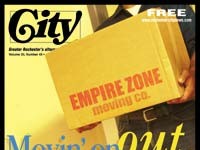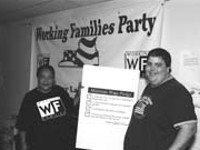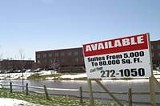‘They level the playing field’
Empire Zone official Rocco DiGiovanni on the county’s suburban zone
By Jennifer Weiss[
{
"name": "500x250 Ad",
"insertPoint": "5",
"component": "15667920",
"parentWrapperClass": "",
"requiredCountToDisplay": "1"
}
]
New York's Empire Zones have fierce defenders and fierce critics. While the zones are intended to boost New York's sagging economy, there's little evidence that they have. Defenders say things would be worse without them. Critics say they're doing more harm than good.
The City of Rochester and MonroeCounty each have an Empire Zone, but criticism has been directed particularly at the county's zone, which consists of numerous individual properties in several suburban towns. Many of those properties are new suburban office parks, which continue to be built despite an oversupply in the Greater Rochester area.
Critics have questioned the county's selection process, and some Democratic County Legislators say they're confused as well.
The legislature was to vote earlier this month on more changes to the county's Empire Zone boundary. Among them: the addition of more suburban office buildings and the removal of a few existing properties from the zone. (The Brooks administration withdrew the request at the last minute, waiting for revisions in the state law governing the zones.)
Two proposed deletions got critics' attention. One was a piece of farmland on East River Road; it was removed because county officials learned that the Empire Zone applicant, developer Anthony Costello, didn't yet own the property. The other was a portion of RochesterTechnologyPark, the former Kodak Elmgrove Plant --- which was the impetus for creation of the county's Empire Zone.
Rocco DiGiovanni, certifying officer of the Monroe County Empire Zone, says the only part of Tech Park that would be removed is land that can't be developed: wetland and a pond, for instance.
DiGiovanni discussed the county's zone in a recent interview. An edited version follows.
City: How do officials decide what properties should be in an Empire Zone? What's the criteria? Would you give them to any developer who asked?
DiGiovanni: No. There are really kind of two tracks. One is for an existing company --- a company that has good opportunities to expand and create jobs if they had the Empire Zone status. That's like a single-user type of project for an existing company.
The other designation is for developers, to occupy a site or vacant buildings or partially vacant buildings, and I think that's really what you're really interested in.
We've developed a set of criteria. The site has to be project-ready. It has to have the appropriate zoning in place. It has to have infrastructure, a developer with a track record, and a commitment to developing this site and having the wherewithal to do that through experience and financing and that sort of thing.
Early on in the process, we sent out to over 100 people --- to developers, builders, business-park owners and so on --- explaining what the program is, asking them to submit proposals if they had appropriate sites. And then we listed these criteria, and from that we got many requests and applications. And subsequent to that we've gotten more, based on a couple of those initial requests for proposals.
City: Do you have a feel for how many new jobs have been brought in from outside the region? Are they just shuffling businesses within the county?
DiGiovanni: Well, a lot of them are jobs that could have gone to other places, and that's one thing that I think a lot of people overlook. For example, Genencor, a company like that has locations in other places in the country. They have to make expansion and consolidation decisions, they have to weigh all the options: should we do it here, should we do it there.
That's part of the negotiations that we enter into with them. And that's a tough competition, because some states are much lower-cost to do business --- let's say the Carolinas, or Texas, or Virginia. The Empire Zone levels that playing field, and so they may not have closed a facility somewhere else and moved the jobs here, but they did the expansion here that could have taken place out of state.
After 9/11 and a severe economic recession --- we're still in an economic downtime. Nationally, there's just not a lot of companies looking to develop facilities around the country, so you don't see a lot of those leads or prospects. We see some, we see more as time goes by, and hopefully we'll see a lot more as the economy picks up.
City: Why not make the entire county an Empire Zone?
DiGiovanni: Well, we only work with what we have. We're given 2 square miles or 1280 acres. There's 650 square miles in the county, so out of that big area we have to pick a very limited area. So we identify those areas that are most ready to be developed. Is it a good idea if you could put them anywhere in the whole state, depending on a deal? That probably would make sense on a case-by-case basis. But again, we have to play the cards we're dealt.
The state says if you get the Empire Zone authorization, you get 2 square miles. The original eligibility for the county to get into the program was because Kodak shut down the Elmgrove facility. You had 5 million square feet of manufacturing and office space that came on the market and was vacated, and all the jobs that were lost.
Before that, we weren't eligible to participate in the program, but there's a category of eligibility called "sudden and severe job loss," and so we became eligible. Five hundred fifty acres of that original 2 square miles, or 1280 acres, went to RochesterTechPark. So a big chunk of it, almost half of it, went there. Over the last two years, we've been allocating other areas in addition to RochesterTechPark.
City: When a property is given Empire Zone status, are all tenants in it eligible?
DiGiovanni: No, anybody has to apply. They have to apply to become a Qualified Empire Zone Enterprise. There's a whole application and certification process. We meet with a company, and we explain the program; there are parameters that they have to figure out based on how many employees, how much hiring they're going to do, how much capital investment they're going to make, and so on. And they have to make a judgment to see if it would work for them. And if they think it would work for them, they make the application, we package it and send it out to the state, and then the state certifies them.
If there isn't a net job increase --- for example, a company is in one town or the city and moves into an Empire Zone, but they don't create a significant number of jobs or make new capital investments --- they're not going to get any benefits.
Just because they're in a zone --- even if they're a zone-qualified business --- if they don't create the jobs or make the investments.... They have to report on that, and the state checks it with the state Department of Labor, for example. If they had a payroll of X one year, they have to prove that they had a payroll of X plus 20 the next year. That's how they verify that they made the job increase. They get the tax breaks based on the percentage increase of jobs and how much capital investment they make.
City: But if you're in an Empire Zone property, you're eligible at least to apply for these things?
DiGiovanni: Yeah.
City: Do you notify tenants? Is it your responsibility to do that, or is it the responsibility of the property owner?
DiGiovanni: We have gone out, the property owners have asked us to do informational meetings, which we have done, so we've done a couple at Rochester Tech Park and some other locations.
City: Is it possible for tenants to be in an Empire Zone property and not even know they're in one?
DiGiovanni: Yeah. But the developers and the owners of the properties have an incentive to pass along information about incentives that companies would be eligible for, because if they grow and expand, that benefits the developer. And that's what they want to see.
City: Are Empire Zones really enabling expansion, or would it have happened anyway?
DiGiovanni: No, they enable expansion. Like I said, a lot of companies here have locations elsewhere. So they have to make those kinds of locational decisions, and a lot of expansion and growth that we have been seeing would not have happened in these small companies without these benefits to make the playing field more level.
Speaking of Empire Zones, Rocco DiGiovanni
-

The Empire Zone strikes back
Jun 26, 2013 -

Movin’ on out
Jul 28, 2004 -

Movin' on out
Jul 28, 2004 - More »
Latest in Featured story
More by Jennifer Weiss
-

To the streets: scenes from the protests
Sep 8, 2004 -

Communication between the communicators
Aug 4, 2004 -

Little political party is winning big
Aug 4, 2004 - More »






